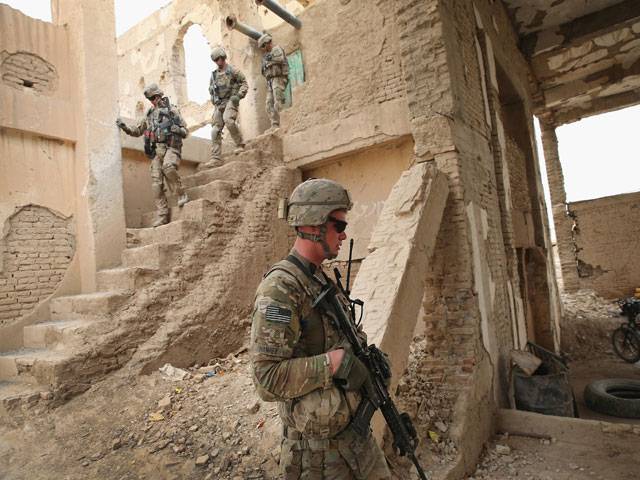Missy Ryan and Phil Stewart - The United States has intensified its drive against the Taliban-linked Haqqani network in an attempt to deal a lasting blow to the militants in Afghanistan before foreign combat forces depart this year, according to multiple US officials.
The effort is taking on added urgency as the clock ticks down on a Nato combat mission in Afghanistan set to end in December, and as questions persist about whether Pakistan will take action against a group some US officials believe is quietly supported by Pakistan.
The Obama administration has created a special new unit based in Kabul to coordinate efforts against the militant group, according to officials familiar with the matter. It was set up late last year, as part of a new strategy that involves multiple government agencies, A unit, headed by a colonel and known in military parlance as a “fusion cell,” brings together special forces, conventional forces, intelligence personnel, and some civilians to improve targeting of Haqqani members and to heighten the focus on the group, the officials said.
“Things are coming together in terms of the more comprehensive approach (against the Haqqanis). So, there’s a lot of focus - there’s a lot of energy behind it right now,” said a US defence official, who asked not to be identified.
It was not immediately clear whether the intensified focus on the Haqqanis has led to increased strikes on the group by the US military or the CIA, which operates drones over Pakistan’s tribal areas.
And it remains to be seen, this late in the Nato combat mission, how much damage the United States can inflict on the Haqqani network, which has proven resilient and uses Pakistan’s tribal areas as a sanctuary.
AUDACIOUS ATTACKS
The White House announced on Tuesday that President Barack Obama had ordered the Pentagon to prepare for a possible complete withdrawal of troops following Afghan President Hamid Karzai’s refusal to sign a bilateral security pact.
The Haqqani network, which professes obedience to Taliban leader Mullah Omar, is believed to have been involved in some of the most audacious attacks of the Afghan war. The group is also believed to be holding Bowe Bergdahl, the only known US soldier missing in the war in Afghanistan.
Some US lawmakers have complained that the Obama administration has dragged its feet in cracking down on the group after designating it a “foreign terrorist organisation” in September 2012.
For example, it is unclear what diplomatic pressure Washington is putting on Islamabad to arrest individuals connected to the group, the lawmakers say.
Earlier this month, the US Treasury froze the US assets of three suspected militants linked to the Haqqanis, the Obama administration’s first significant non-military move against the network since that 2012 designation.
The Pentagon has regarded the Haqqanis, seen as more skilled in attacks on foreign targets than other militants in Afghanistan, as an acute threat to its soldiers for years.
US General Joe Dunford, who commands US and allied forces in Afghanistan, told Defence Secretary Chuck Hagel of his concern about the state of the current US effort against the group in a private letter last November, sources familiar with the matter said. During a recent visit to Washington, Dunford told senior White House officials that the group was a top priority for him, the sources said.
‘PERVASIVE, VIRULENT ENTITY’
Retired General John Allen, who commanded US and Nato forces in Afghanistan from 2011-2013, said he initiated the request to designate the Haqqanis as a terrorist group in spring 2012 because military efforts alone were insufficient.
“My reason for doing that was that it is simply such a pervasive, virulent entity,” Allen said in an interview. “I was going to pressure them in every possible way inside the country, but I wanted them to feel it at a strategic level, to include attacking their finances, their assets - pressuring the entire nervous system of the Haqqanis.”
Some Afghan and US officials remain sceptical that the United States can seriously weaken militant groups such as the Haqqanis unless Pakistan cracks down on them from within or better controls its borders.
“Until the Pakistanis do something about the safe havens, that’s going to be a problem. (Militants) can recruit and train and equip and prepare to launch in Pakistan,” said Major General Stephen Townsend, who commands US and Nato forces in eastern Afghanistan.
Townsend was speaking about the array of militants who infiltrate the border with Pakistan, not just the Haqqanis.
The former top US military officer, Mike Mullen, told US lawmakers in 2011 the Haqqanis were a “veritable arm” of the Pakistani intelligence agency ISI, which some US officials believe seeks to strengthen the Taliban and its allies as a means of ensuring that archenemy India does not wield influence in Afghanistan. Pakistan denies such charges.
Founded by mujahideen leader Jalaluddin Haqqani, the group fought the 1980s Soviet occupation of Afghanistan with varying levels of support from Pakistani, Saudi and US policy-makers.
In November, six members of Congress sent Obama a letter calling efforts against the Haqqanis “woefully insufficient”, according to a copy of the letter obtained by Reuters. “It is past time for the administration to comprehensively address the threat posed by the Haqqani network’s deadly attacks,” Mike Rogers, chairman of the House Intelligence Committee, told Reuters in a statement. –Reuters
Thursday, April 18, 2024
Eyeing Afghan exit, US intensifies campaign against Haqqanis

Caption: Eyeing Afghan exit, US intensifies campaign against Haqqanis
The Hidden Violence
April 18, 2024
Courage vs Hypocrisy
April 18, 2024
Modi’s Pulwama-Like Operations
April 18, 2024
Justice denied
April 18, 2024
AI dilemmas unveiled
April 18, 2024
Rail Revival
April 17, 2024
Addressing Climate Change
April 17, 2024
Saudi Investment
April 17, 2024
Political Reconciliation
April 16, 2024
Pricing Pressures
April 16, 2024
Workforce inequality
April 17, 2024
New partnerships
April 17, 2024
Shikarpur crisis
April 17, 2024
Peace quest
April 17, 2024
Democratic harmony
April 16, 2024
ePaper - Nawaiwaqt
Advertisement
Nawaiwaqt Group | Copyright © 2024





